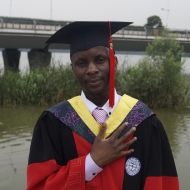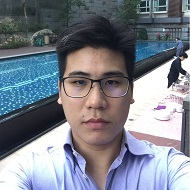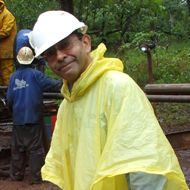Harold is an Associate Professor and Deputy Dean of Faculty for Applied Sciences at the University of Malawi. His key professorial responsibilities include teaching environmental engineering; supervising student research and development; developing and reviewing curriculum; linking postgraduate programmes to research; mentoring new academics; and engaging with consultancies and community-level environmental outreach. As Deputy Dean, he is additionally responsible for assisting the Dean in the daily running of the faculty.
Upon completing his BSc in Environmental Science and Technology, he began his career in 2003 as a Staff Associate at the University of Malawi. During this time, he embarked on an MSc in Environmental Sanitation from Ghent University in Belgium which led to a promotion to Full Lecturer once completed in 2007. Five years later, he was promoted again to Senior Lecturer whilst simultaneously serving as Deputy Head of the Physics and Biochemical Science Department. In the same year, 2012, Harold started his PhD in Environmental Engineering at China University of Geosciences (Wuhan) in the Faculty of Environmental Studies to which he graduated from in 2016 after successfully defending his thesis in Numerical Modelling of Groundwater Hydrochemistry. He was subsequently promoted to his current role of Associate Professor that same year and was re-tasked with Deputy Head of Department in 2017. In 2018, he was nominated and approved as the Deputy Dean of Faculty for Applied Sciences.
Harold believes the most fulfilling aspects of his job are sharing skills through the teaching of environmental engineering courses and conducting environment outreach, particularly when working with grassroots communities, such as through the restoration and conservation of wetlands and catchment areas, and the assurance of environmental quality to citizens. He acknowledges that the projects he is involved in give him a sense of attachment and duty to the public as a citizen. Recently, he worked on the remediation of land contaminated by an accidental oil spillage from a carrier train in the city of Blantyre. Despite no details about the spillage being available at the time, Harold and his team were not deterred and instead initiated a hunt for information about the timing, nature and steps taken after the spillage, swiftly leading to the successful remediation of the site in 2018.
In 2017, Harold joined the IES as a Full Member in order to align himself with the professional conducts and confidence attached to affiliating with a professional body in his chosen field, such as undertaking vital Continuing Professional Development (CPD) and building professional links with environmental scientists across the world. He aspires to become a Chartered Environmentalist (CEnv) through the IES in the near future.
"[My] paramount reason for the choice from amongst many such bodies globally is that membership to IES promotes professional career growth by considering CPD as a significant part of maintenance and upgrading of members' skills."
In the future, Harold would like to create his own environmental consultancy firm specialising in groundwater and surface water management. Additionally, he wishes to remain involved in environmental conservation and management projects, particularly in villages where such information may be lacking in order to train future local leaders and subsequently educate these communities.




